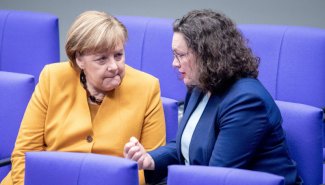Germany: the crisis inside the SPD is posing a risk to the grand coalition

Andrea Nahles stepped down as the leader of the SPD on 3 June. The following day she also stepped down from her role as the head of the Social Democrats’ grouping in the Bundestag. She announced that she will relinquish her parliamentary seat and withdraw from politics. By the time a new party leader is elected, the German Social Democrats will be temporarily directed by a trio: Minister-President of Mecklenburg-Vorpommern Manuela Schwesig, Minister-President of Rhineland-Palatinate Malu Dreyer and the leader of the SPD in Hesse Thorsten Schäfer-Gümbel. Rolf Mützenich, who has served as the deputy-leader of the parliamentary grouping, will serve as acting leader. Most likely, the function of the party president and the faction head in the Bundestag will be split, and a vote in which all party members will take part will decide on the choice. The election procedure is to be announced on 24 June. Chancellor Angela Merkel, in her comment on the resignation of the SPD’s president, emphasised her desire for the government to continue working as part of the grand coalition.
Commentary
- Nahles resigned under pressure from party members after the worst national election results in history. The level of support for the SPD in the election to the European Parliament (EP) was 15.8% (-11.5 percentage points as compared to 2014). The party also lost the election to the local parliament in Bremen for the first time in 73 years. The SPD is internally broken in terms of both staff (Nahles was the tenth president of the party over the past 18 years) and agenda (it is involved in disputes over the migration and climate policies and the continuation of the grand coalition among other issues). Most deputies in the Bundestag and members of the party assemblies want to continue the existing co-operation with the Christian Democrats, while ordinary party members and the influential Social Democrat youth movement, Jusos, are opposed to this.
- The most serious dispute inside the SPD concerns the evaluation of the reforms of the labour market and the welfare system Agenda 2010 initiated by Gerhard Schröder (SPD) in 2003. They brought about an improvement of the economic situation in Germany but have been seen by the SPD’s electorate as a betrayal of the ideals of the political left. The Social Democrats have not managed to regain their reputation and trust, especially given the activity of its rival, the Left Party (5.5% in the election to the EP), which has been making efforts to win the votes of those groups which view themselves as socially excluded. The traditional division which sees labourers voting for the SPD is disappearing (only around 18% of labourers supported the SPD in the election to the EP, and the AfD achieved a similar result; the party which enjoys the strongest support from this group is the CDU – around 27%). The existing model of classifying voters according to social groups is outdated and has nothing in common with the aspirations of the SPD’s electorate.
- In the European context, the crisis inside the SPD is undermining the position of the European Socialists in the negotiations concerning the distribution of positions in EU institutions, including the position of the President of the European Commission. A possible snap election in Germany will also impede the preparations for Germany’s presidency of the Council of the EU which is about to begin in the second half of 2020. As regards the domestic political scene, the chaos inside the SPD and the election of its new leaders will affect how the elections to local parliaments in eastern federal states are held and their result there. These are being held in: Brandenburg and Saxony (on 1 September) and Thuringia (on 27 October). The debate over personnel and how to make those responsible for the party’s poor performance accountable inside the SPD will adversely affect the already low support levels for the Social Democrats who have co-governed these federal states. The pressure to elect a new president of the SPD from among those who want to discontinue the coalition with the CDU/CSU will also grow. At present, there are no obvious candidates for the position of the SPD’s head. One candidate from outside the party’s mainstream may be the president of Jusos, Kevin Kühnert, who is 29 years old and is an informal leader of opponents of the grand coalition. He has a chance of convincing a section of young voters to back him.
- If the SPD leaves the coalition, the most likely scenario will be a snap election to the Bundestag (the present term of the Bundestag ends in autumn 2021). The Green Party wants a snap election as its support levels have been growing at a record-high rate and it currently has the smallest number of seats in the Bundestag. In turn, the CDU is emphasising the need to continue the grand coalition to maintain stability in the state. It is also suggesting that it will put the blame on the SPD if co-operation is discontinued. One effect of the chaos among the Social Democrats is the reduction of pressure on the president of the CDU, Annegret Kramp-Karrenbauer, to make those responsible for the party’s very poor result in the election to the European Parliament accountable. If the party’s results in the autumn elections in the eastern federal states and in a possible snap election to the Bundestag are poor, there will be less certainty that Kramp-Karrenbauer will be elected chancellor.





